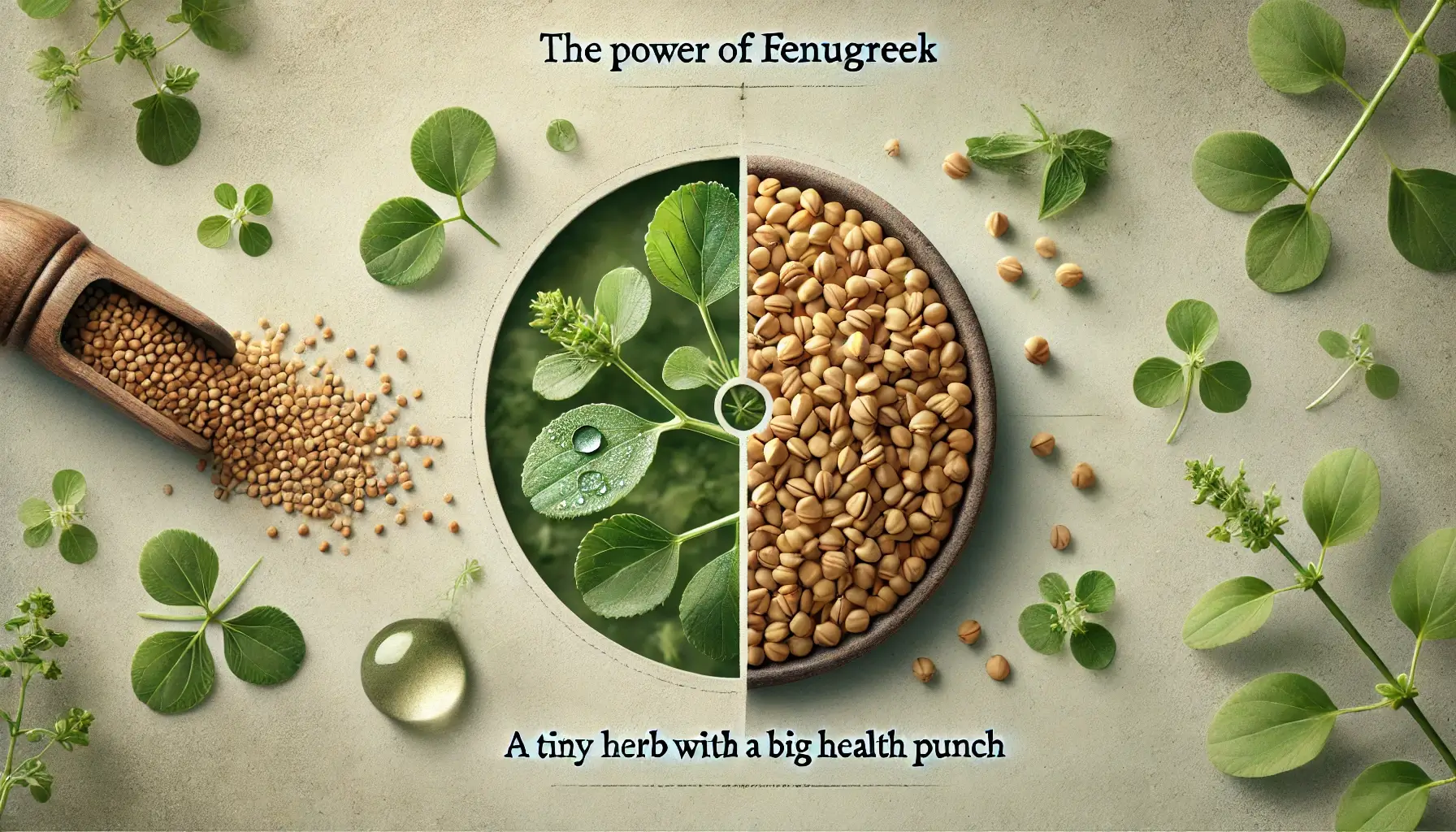The Power of Foenegriek | A Tiny Herb with a Big Health Punch
Foenegriek—officially called Trigonella foenum-graecum—has been a kitchen and medicine cabinet staple for more than 3,000 years. It first sprouted in the Mediterranean, but today, you’ll find it everywhere, from spice racks to health-food aisles. With a sweet, nutty flavor and a hint of bitterness, this little seed knows how to spice a meal and boost wellness at the same time. Whether you’re sprinkling it in a recipe or brewing it in tea, Foenegriek deserves a seat at today’s health conversation.
This post will break down what Foenegriek can do for you, peek at what’s packed inside its tiny seeds, and offer easy ways to weave it into your everyday life for better health.
What Is Foenegriek?
Foenegriek is a short, bushy plant that belongs to the legume family. It grows about two feet tall and features small, green, clover-like leaves and delicate yellow flowers. The flat, golden seeds are the star of the show, prized for both flavor and function. Cooked in spicy lentil dishes, rubbed into flatbreads, or brewed in tea, the seeds show up at the dinner table in cuisines from India to the Middle East to Southern Europe.
Foenegriek seeds carry a unique, slightly bitter taste that hints at maple syrup. Packed with alkaloids, flavonoids, and saponins, these tiny seeds offer a roster of impressive health perks.
Nutritional Profile of Foenegriek
To appreciate Foenegriek, start with its nutrition. For every 100 grams of seeds, you’ll find:
- Calories: 323 kcal
- Protein: 23 grams
- Carbohydrates: 58 grams
- Fiber: 25 grams
- Fat: 6 grams
It also brings a handful of vitamins and minerals:
- Vitamin A: 0.02 mg
- Vitamin C: 1.5 mg
- Iron: 33.5 mg
- Magnesium: 191 mg
- Potassium: 770 mg
- Calcium: 176 mg
That’s a lot of fiber, protein, and important micronutrients packed into one small seed.
Health Benefits of Foenegriek
Boosts Digestive Health
Foenegriek shines most brightly in digestive health. The fiber in the seeds helps keep everything moving in the intestines, so constipation is less of a problem. When Foenegriek is soaked, it turns into a slippery, gel-like substance that can coat the stomach lining. This gentle coating helps calm down conditions like gastritis and acid reflux, leaving the digestive tract feeling soothed.
Foenegriek seeds have substances that nudge your body to make more bile. Bile helps break down fats, so your digestive tract runs smoother and your liver stays safe from damage. For anyone facing tummy troubles, a sprinkle of Foenegriek seeds can be a gentle, natural helper.
Supports Heart Health
Foenegriek is a friend to your heart for a few good reasons. Its mix of fiber and antioxidants can nudge your cholesterol numbers in the right direction, lowering the unwanted LDL cholesterol and raising the good HDL. Because fiber is a superstar at this, Foenegriek works hard to keep your blood fats balanced.
On top of that, Foenegriek has natural anti-inflammatory powers. By dialing down inflammation, it can help prevent the plaque that clogs arteries, keeping your heart strong and your blood vessels clear.
Helps Manage Diabetes
For generations, Foenegriek has been the go-to plant for folks keeping an eye on blood sugar. Research backs this up, especially for Type 2 diabetes. The soluble fiber in Foenegriek seeds slows down how quickly sugar from your meals zooms into your bloodstream. The result? Fewer dramatic blood sugar spikes after you eat, keeping your energy steady and your long-term health on track.
Foenegriek has also been found to boost insulin sensitivity. This means it can be helpful for people with diabetes who want to keep their blood sugar levels stable. By using Foenegriek regularly, some people find they need less insulin or fewer diabetes medicines.
Boosts Milk Production for Nursing Moms
Many moms swear by Foenegriek when breastfeeding. Lactation consultants often recommend it to help increase milk supply. The plant has natural compounds similar to estrogen, which support the glands that create milk.
Studies back this up: moms who take Foenegriek regularly see a real increase in breast milk, especially if they started out with low supply. You can find Foenegriek in capsules, drink it as tea, or sprinkle the seeds in meals to help boost lactation.
Supports Weight Loss Goals
Foenegriek can also play a role in losing weight. Its fiber keeps you feeling full longer, which means you might not snack as much. Plus, Foenegriek can give your metabolism a little extra fire, helping you burn more calories.
Some studies show that it can help cut body fat while keeping muscle. Adding it to your weight-loss routine is an easy, natural step.
Supports Radiant Skin and Strong Hair
Foenegriek is a hidden gem for skin and hair. The seeds pack a punch of antioxidants that helps safeguard your skin from free radical damage, which can lead to wrinkles and fine lines. Plus, when applied to the skin, Foenegriek calms redness and speeds up healing, making it a gentle remedy for eczema, acne, and other irritations.
When it comes to your hair, the seeds are rich in lecithin, a natural emulsifier that strengthens hair roots, cuts down on shedding, and encourages new growth. You can grind soaked seeds into a smooth paste and massage it into your scalp for a weekly boost that leaves your hair feeling silky and thick.
How to Add Foenegriek to Your Plate?
Working Foenegriek into your day is easy and delicious. Try these simple ideas to start reaping the benefits:
- Foenegriek Tea: Measure out 1-2 teaspoons of seeds, steep them in hot water for 5-10 minutes, and strain. Sip the warm tea for a gentle health boost.
- Foenegriek Sprouts: Soak seeds in water overnight, then rinse and keep in a jar until tiny sprouts appear. Add them to salads, sandwiches, or wraps for a crunchy, nutrient-packed twist.
- Foenegriek Powder: You can find Foenegriek powder at most health food stores. It makes a simple addition to smoothies, soups, and curries.
- Foenegriek Capsules: For those who prefer a quick option, Foenegriek capsules are easy to find in health stores and online.
Always remember to keep your Foenegriek use moderate. It can bring several health perks, but too much may upset your stomach. Starting with a small amount and slowly increasing it is the safest way to go.
Conclusion
Foenegriek is more than just an herb; it has been valued for taste and wellness for generations. It can help your heart, ease digestion, keep blood sugar steady, and support nursing moms. Adding Foenegriek to your routine could be a simple way to boost your health.
Adding Foenegriek to your daily menu is simple, and it’s a natural way to support your wellness. You can sprinkle the seeds on your food, brew them into a soothing tea, or take them as a capsule. Packed with vitamins and minerals, this humble herb can boost your well-being in several ways. Why not try it and feel Foenegriek’s benefits for yourself?
FAQ’s
Can I eat Foenegriek every day?
Yes, eating Foenegriek every day is safe for most people in small to moderate amounts. If you are pregnant, nursing, or on medication, it’s wise to chat with your doctor first.
Can Foenegriek help with blood sugar?
Absolutely! Foenegriek can help balance blood sugar and improve how your body uses insulin, which is especially useful for people managing Type 2 diabetes.
When will I feel Foenegriek’s benefits?
While everyone is different, many people notice better digestion, more energy, and, for nursing mothers, more milk, in just a few weeks of using Foenegriek regularly.



